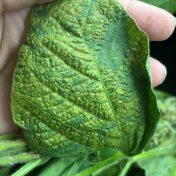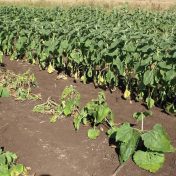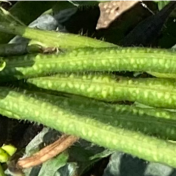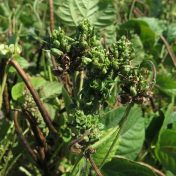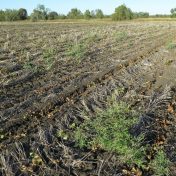Earlier this year, the Queensland Department of Primary industry (DPI) pathology team received samples of soybean with virus-like symptoms. Diseased plants displaying strong chlorotic mottle on leaves and leaf crinkling (see images below) were scattered through the crop. While the samples tested positive in a polymerase chain reaction (PCR) test for potyvirus, the actual species remained a mystery. Subsequent sequencing… Read more »
The recent declaration of El Niño conditions for eastern Australia means an increased chance of below average rainfall. Historically, these conditions can lead to more severe outbreaks of tobacco streak virus. However, with forward planning and selection of suitable sunflower hybrids, the risk of economic impacts from TSV can be avoided. If sunflowers crops are planned for early 2024 in… Read more »
A severe outbreak of phytoplasma disease has been reported in mungbeans from the Burdekin region. Symptoms of little leaf, phyllody (greening of flower structures) and puffy pod became obvious in mid-late October and have now affected a high incidence of plants in a 25 ha planting. Puffy pod affected plants typically remain green for longer than healthy mature plants. This… Read more »
In Central Queensland, both phytoplasma and tobacco streak virus are still a common occurrence this year in mungbean crops. Phytoplasma Transmitted by leaf hoppers, the specialised bacteria of phytoplasma can cause severe disease and reduce yield and/ or affected pods in mungbean and other grain legumes like soybean, peanuts, pigeon pea and chickpea. Phytoplasma infection in mungbean and other grain… Read more »
Key points: There was a resurgence in tobacco streak virus (TSV) disease in mungbeans in early 2020 TSV is restricted to central QLD and closely related to the distribution of parthenium weed Growers are encouraged to avoid areas of dense parthenium to reduce risk In autumn of 2020, tobacco streak virus (TSV) was found to be common in all mungbean… Read more »
A devastating disease was observed in several paddocks of soybean crops in the Branchview area of the Darling Downs in late autumn 2016. Almost 100 percent of plants were affected in some paddocks. The affected plants produced no, or very few filled pods and instead had a proliferation of tiny immature pods as shown in Photos 1 and 2. The plants… Read more »
